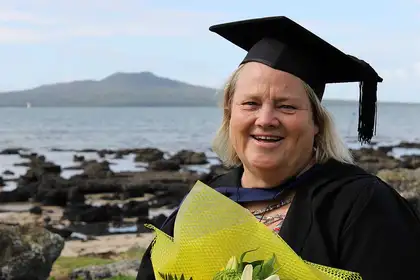
Sandra Starr following her graduation in Auckland as a Master of Specialist Teaching.
Helping teachers analyse their own practices helps create positive change for Māori in the classroom. That’s the finding of a new study from Massey University Master of Specialist Teaching graduate Sandra Starr.
Rather than focus on issues with children, Ms Starr worked with three teachers helping them to analyse their own teaching practice to see what they could learn and change. Working collaboratively, they found practical steps each could take.
“Teaching is supposed to be data based – you know, you get your data and you teach your child what they need to know next, and then you gather data to prove you’ve done it. What I did was gather data on three individual teachers and have the teachers analyse it, with support from me. We then put the theory across the top of it, and decided on a design for improving each teacher’s practice.”
Post-analysis showed clear steps towards improved practice, and a positivity towards the process continuing.
Ms Starr, of Ngāpuhi descent, is a Resource Teacher: Learning and Behaviour (RTLB) with the Ministry of Education, based in the southern Bay of Islands. Her job involves working with schools, teachers and whānau to support students with learning and behaviour issues. Her study through Massey University enabled her to work with the theory that how teachers talk with, and to, their students can make a big difference in dealing with engagement issues, and that, when working with teachers, collaborative learning processes are an effective way to create positive change.
Ms Starr says, for example, one teacher identified the need to think about what the rest of the class was doing while she was working with one group, developing a ‘roving eye’. Another teacher was encouraged to use specific praise, while another technique was encouraging interaction and giving students a voice rather than a stream of instruction.
“We’ve got so caught up in meeting standards set by someone else from somewhere else that we’ve lost the essence, sometimes, of who we are there for. I think that working with teachers to reflect on their own practice in a safe environment that is not ‘top down’ is a positive way to work.”
Ms Starr says educators need to look at what’s happening with the child at home, at school and in the community, at what they’re good at, and what the teacher is good at, and then building on that.
“We’re constantly told that evidence-based practice is using an international testing programme to judge a child or a teacher, when really the best evidence comes from whānau and a teacher working together, around a child.
Juggling fulltime work and distance study at Massey University has been a big challenge but Ms Starr says it’s been rewarding. “What was really positive about the Masters Specialist Teaching programme is that it’s based on your work and putting theory into practice. The professional inquiry part of it was looking at something that was going to directly affect my practice as an RTLB, and that I can share with others. I loved the theory and practice working together.”
Ms Starr said it is also about creating a different, more local, evidenced-base model, that can be used alongside school-wide and national programmes to tackle the issues of underachievement by Māori in our schools. Ms Starr hopes by sharing what she has learnt, both her RTLB practice and classroom practice in schools, will improve. “If we can get teachers reflecting on their own practice, analysing their own practice, they’re going to be increasingly professional, knowledgeable and open to taking on new things.”